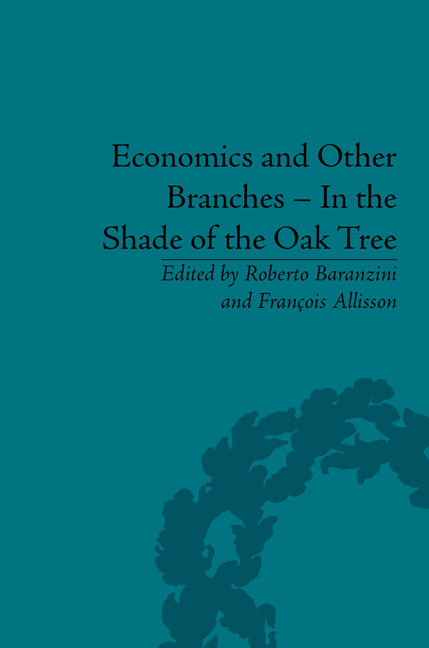Book contents
- Frontmatter
- CONTENTS
- List of Contributors
- List of Figures and Tables
- Introduction
- Pascal Bridel's Bibliography (up to 2013)
- Part I Léon Walras's Economic Thought
- Part II The Spreading of Thought
- Léon Walras's Reception
- The Lausanne School
- French Matters
- Cambridge UK
- Part III Monetary Theory
- Part IV Methodology
- 18 The Economics of Ethics and the Ethics of Economics in Adam Smith
- 19 Why do Economists and Philosophers Resort to the History of their Discipline?
- 20 Interest-Based Prediction and Mutual Expectations: Reflections on the Normative Value of Hobbesian Methodology
- 21 Tempests of the Business World: Weather Metaphors for Crises in the Nineteenth Century
- 22 Samuelson and the Non-Substitution Theorem: Some Methodological Remarks
- Part V Economics and Humanities
- Economics and Social Sciences
- Some Insights from Visual Arts
- Part VI Economics and Civil Society
- Notes
- Index
19 - Why do Economists and Philosophers Resort to the History of their Discipline?
from Part IV - Methodology
- Frontmatter
- CONTENTS
- List of Contributors
- List of Figures and Tables
- Introduction
- Pascal Bridel's Bibliography (up to 2013)
- Part I Léon Walras's Economic Thought
- Part II The Spreading of Thought
- Léon Walras's Reception
- The Lausanne School
- French Matters
- Cambridge UK
- Part III Monetary Theory
- Part IV Methodology
- 18 The Economics of Ethics and the Ethics of Economics in Adam Smith
- 19 Why do Economists and Philosophers Resort to the History of their Discipline?
- 20 Interest-Based Prediction and Mutual Expectations: Reflections on the Normative Value of Hobbesian Methodology
- 21 Tempests of the Business World: Weather Metaphors for Crises in the Nineteenth Century
- 22 Samuelson and the Non-Substitution Theorem: Some Methodological Remarks
- Part V Economics and Humanities
- Economics and Social Sciences
- Some Insights from Visual Arts
- Part VI Economics and Civil Society
- Notes
- Index
Summary
Two Roles of History and Two Ways to Compare History of Economics and History of Philosophy
History of economics is not considered as the core of economics, which is supposed to be the theory of general equilibrium and game theory (one can add the theory of social or collective choice). Econometrics is in the second circle, providing theory with empirical data, and experimental economics and neuro-economics are newborn marginal fields, a bit heterodox in their inspiration. History of economics is supposed to be an ancillary discipline, but can be taken either as a way of criticizing the mainstream, or from the orthodox point of view. In the second case, the historian uses methods of history and history of science in order to show through which steps economics has been developed until it comes to its supposed acme (the combination of general equilibrium and game theory). In the first one, the historian pays attention to ways of thinking that have been left aside in this development and evaluates the theoretical cost of such giving up – mainly, the inadequacy of economics with real social interactions.
Pascal Bridel knows very well the details and limits of the theory of the general equilibrium. At the same time, he uses the methods of history to examine what were the real contents and aims of the works of such prominent economists like Walras and Pareto.
- Type
- Chapter
- Information
- Economics and Other Branches – In the Shade of the Oak TreeEssays in Honour of Pascal Bridel, pp. 267 - 276Publisher: Pickering & ChattoFirst published in: 2014



